Photo ID, absentee ballot deadlines: How Ohio Republicans want to change election rules

Ohio lawmakers are poised to vote this week on sweeping changes to state election laws that could redefine everything from ID requirements to timelines for absentee voting.
Senate Republicans merged ideas from multiple election bills into one proposal that would require mail-in ballots to arrive by Election Day and mandate photo ID, among other ideas. A vote on the Senate proposal is expected in the coming days as lawmakers aim to wrap up their lame-duck session before the holidays.
"We're going to pass an election bill, I believe next week," Senate President Matt Huffman, R-Lima, told reporters last week. "It's going to have a lot of the things that Rep. (Bill) Seitz wanted in it. But I don't think the House is passing an elections bill."
The Senate package incorporates elements of separate legislation introduced by Seitz last year. Seitz's bill was passed out of a House committee Monday, but its fate beyond that is unclear. House Speaker Bob Cupp, R-Lima, said House and Senate leaders are having discussions about both election bills.
Voting rights advocates have said the Senate proposal would make it harder for Ohioans to vote. Critics also contend these bills are a red herring to appease election skeptics, as voter fraud in Ohio is extremely rare.
Here's what Senate Republicans have proposed.
Absentee voting in Ohio
A major change would require mail-in absentee ballots to arrive by the close of polls on Election Day. Any that arrive after that would not be counted. Current law counts any ballots that arrive within 10 days of the election, as long as they're postmarked before Election Day.
It's unclear exactly how many valid ballots arrived within 10 days of the Nov. 8 election, but election officials estimate that number is in the thousands.
If passed, Ohio would join 30 other states that require ballots to arrive on or before Election Day, according to the National Conference of State Legislatures. A handful of states have a 10-day grace period specifically for military and overseas ballots, but the Ohio Senate proposal does not include that exemption.
The bill also prohibits the secretary of state from sending unsolicited absentee ballot applications or prepaying for postage on returned applications or ballots. Voters who want to cast a ballot by mail would need to submit an application at least seven days before Election Day, instead of three.
Photo ID
The Senate bill would require voters to present a photo ID to cast their ballot. As part of that, any Ohioan 17 and older would be eligible to receive a free state ID card. Licenses and ID cards must also note if the person is not a U.S. citizen.
Right now, voters can use alternative forms of identification at the polls, such as utility bills or bank statements.
Early voting in Ohio
The bill eliminates early in-person voting the Monday before Election Day.
Ballot drop boxes
Only one drop box would be allowed per county, and they must be installed at the county board of elections office.
August special elections
The original intent of the bill, amended by Senate lawmakers, was to eliminate most special elections in August unless the county, municipality or school district is under a fiscal emergency.
USA TODAY Network Ohio Bureau reporter Anna Staver contributed to this report.
Haley BeMiller is a reporter for the USA TODAY Network Ohio Bureau, which serves the Columbus Dispatch, Cincinnati Enquirer, Akron Beacon Journal and 18 other affiliated news organizations across Ohio.
This article originally appeared on Cincinnati Enquirer: Ohio Republicans mull changes to election, voting laws

